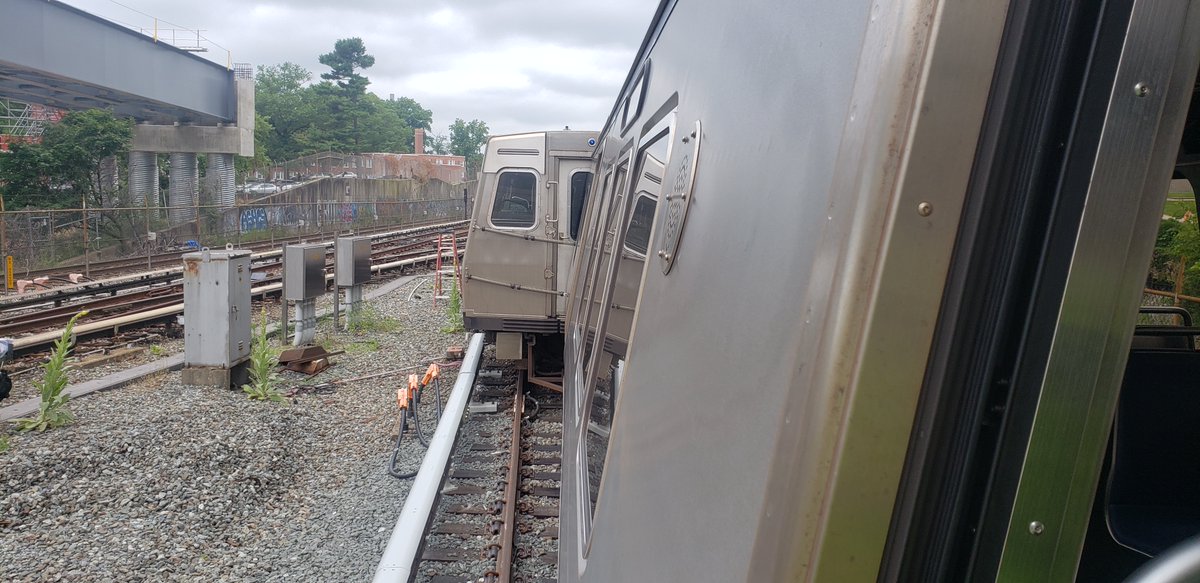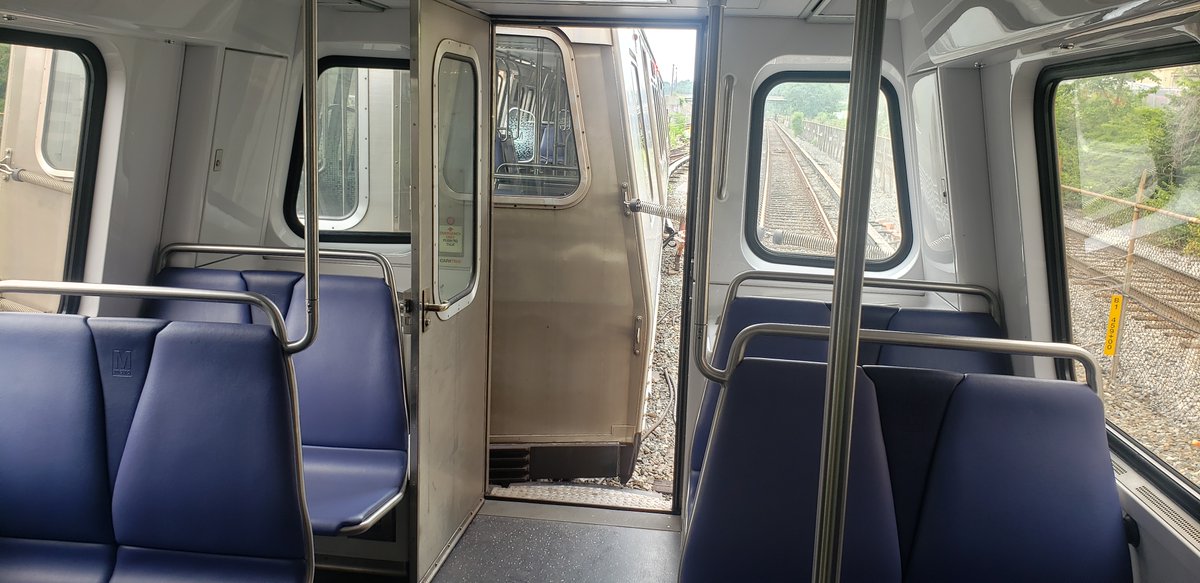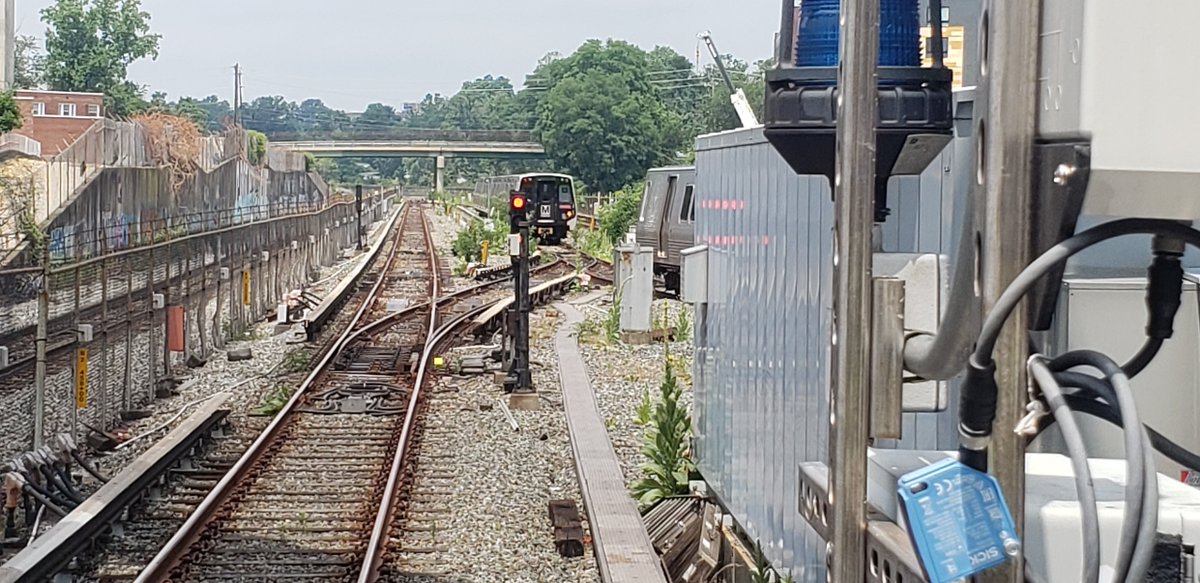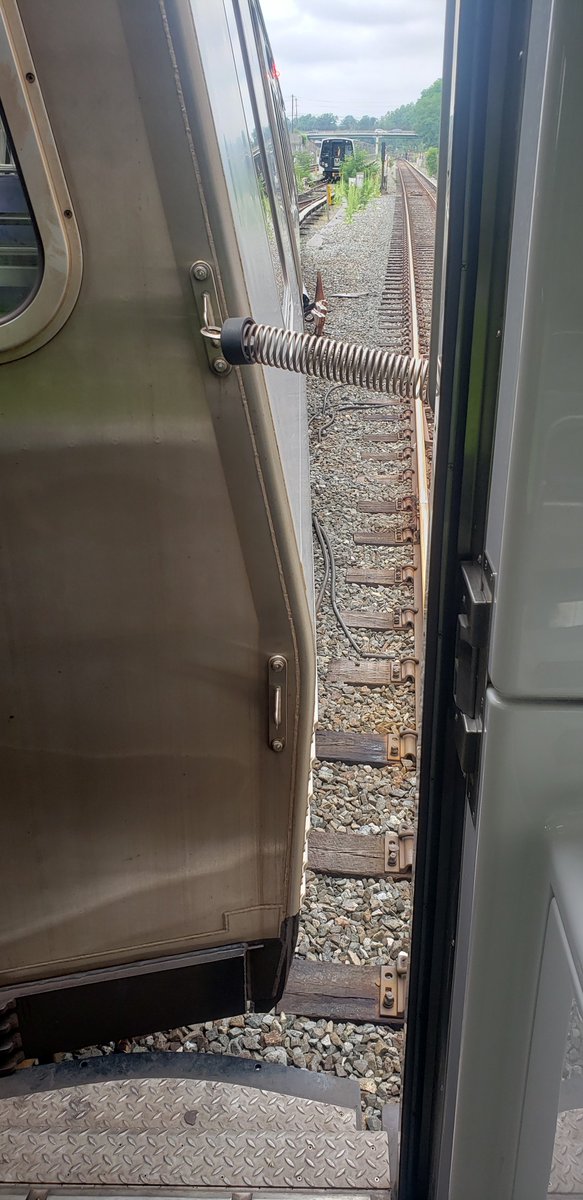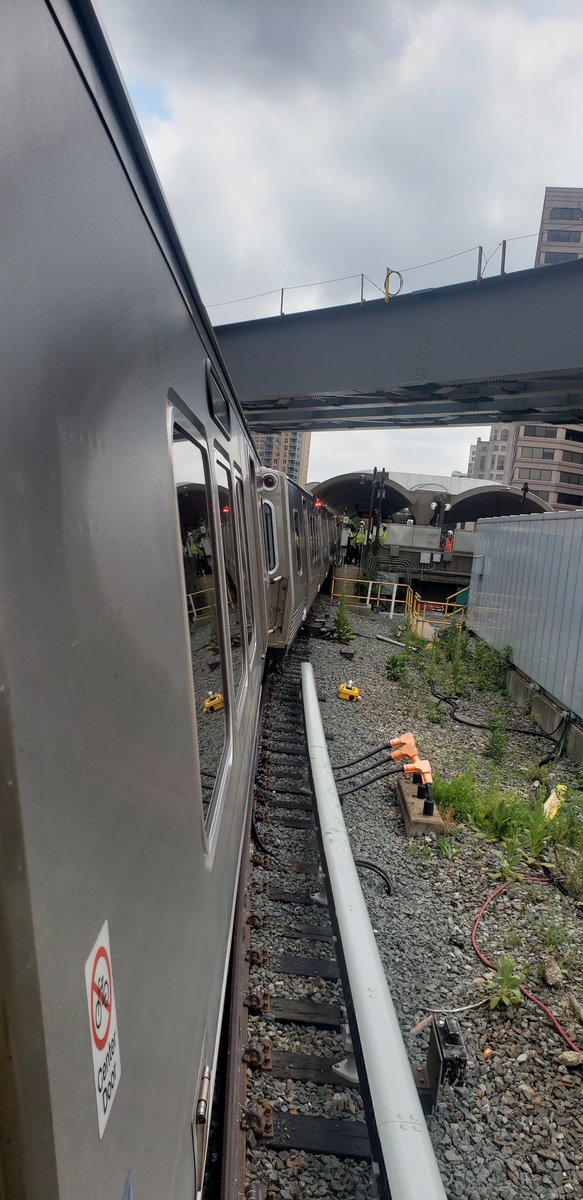
Today’s meeting includes an update on ongoing investigative work, vote on a final #WMATA safety event investigation report, other oversight and audit updates & more
Watch live starting at 12:30 wmsc.gov/meetings/
Watch live starting at 12:30 wmsc.gov/meetings/
We are proud to offer closed captioning to make this meeting more accessible. If you want the option to turn the captions on/off, please join us through Zoom.
Also join through Zoom webinar link here if you would like to participate with public comment wmsc.gov/meetings/
Also join through Zoom webinar link here if you would like to participate with public comment wmsc.gov/meetings/
Join us on YouTube now for our public meeting on our #WMATA oversight work:
Today’s safety message: With Thanksgiving coming up, important to keep public health emergency in mind. Keep your distance, wear a mask, and stay home to help save lives. Wash your hands.
Consider joining family via video calls rather than in-person if you do not live together
Consider joining family via video calls rather than in-person if you do not live together
Now on to public comments (you can always reach out @MetrorailSafety here, on Facebook, Instagram, via email or through our web form wmsc.gov/report/)
Chair Hart opening remarks begin by welcoming our new Alternate Commissioner Robert Lauby. His distinguished career includes service @NTSB, as Chief Safety Officer @USDOTFRA, and as WMATA Board alternate.
“We are thrilled to be able to benefit from his experience and expertise”
“We are thrilled to be able to benefit from his experience and expertise”
@NTSB @USDOTFRA Mike Rush now Commissioner to fill Mark Rosenker’s seat.
Chair Hart: “I am saddened by the circumstances...,with the loss of our friend...Mark Rosenker, but I look forward to working closely with both of you as we continue our efforts to drive continual safety improvement.”
Chair Hart: “I am saddened by the circumstances...,with the loss of our friend...Mark Rosenker, but I look forward to working closely with both of you as we continue our efforts to drive continual safety improvement.”
Chair Hart: Ahead in this meeting:
- update on investigations & oversight work
- final investigation report
- update on Metrorail’s development of corrective action plans related to the Rail Operations Control Center
- Metrorail’s first Public Transportation Agency Safety Plan
- update on investigations & oversight work
- final investigation report
- update on Metrorail’s development of corrective action plans related to the Rail Operations Control Center
- Metrorail’s first Public Transportation Agency Safety Plan
CEO David Mayer: I’d like to start with an update on the needed safety improvements in the Rail Operations Control Center (ROCC)
Metrorail submitted draft Corrective Action Plans for the 21 findings in the ROCC Audit on time late last month. Our review of these proposals has identified a number of improvements that are required before we can approve these CAPs for implementation.
CEO Mayer: We have communicated the necessary improvements to the proposals to Metrorail.
Mayer: Metrorail’s first Public Transportation Agency Safety Plan (PTASP) is a significant step in Metrorail’s safety journey that is required by the Federal Transit Administration (@FTA_DOT) and the WMSC.
A PTASP requires a comprehensive safety management approach involving everyone in the organization in a proactive and data driven approach.
This can take time to fully implement, however, having the plan in place is an important first step toward bringing SMS to Metrorail.
This can take time to fully implement, however, having the plan in place is an important first step toward bringing SMS to Metrorail.
We have worked closely with Metrorail to direct necessary improvements during the Agency Safety Plan’s development. Approval today would meet the Federal Transit Administration’s enforcement deadline of December 31.
On the October 9 pull-apart on the Red Line, we continue to gather more information, including by participating in various interviews related to the investigation.
There are some interim mitigations being taken and developed as a result of the investigation so far. Work on a final investigative report should be complete early next year.
Turning to the upcoming Presidential Inauguration, WMSC Staff are monitoring inauguration planning and drills, and we will be ready for all necessary safety oversight activities.
Our staff will be observing a separate emergency exercise scheduled this weekend at the Vienna Station. It is the first big WMATA emergency exercise under social-distancing protocols.
Our latest 2020 inspection reports (170+) are now available online. This includes both in-person and remote inspections, which have, in combination, allowed us to fully carry out our oversight duties even during the public health emergency. wmsc.gov/oversight/insp…
On a safety concern raised by a Metrorail employee about Roadway Worker Protection on the Red Line near Union Station: WMSC quickly investigated and concluded the valid concern regarding a lack of clearance required action
On October 28 we directed WMATA to require foul time - a higher level of Roadway Worker Protection - on Track 1 at the interlocking until the correct level of permanent protection can be identified. Metrorail complied with our 24-hour deadline by issuing an order on October 29
CEO Mayer: I am pleased that our staff worked quickly to evaluate this safety concern and take action, and we thank Metrorail for its timely compliance with our directive
One final safety event investigation report on today’s agenda: It’s an investigation into a violation of Roadway Worker Protection procedures at East Falls Church on August 19. WMSC Operations Expert Bruce Walker presenting
Walker: At time of this event, East Falls Church was closed to customers with trains bypassing due to long-term platform construction
The operator of an outbound Silver Line Train did not stop for an Advance Mobile Flagger who was properly stationed at the end of the platform. The AMF’s flag was furled. 

The train entered the station at 33+ mph, above the 25-mph limit for trains bypassing a station. Video from the train shows the AMF was not visible to the train operator until the train was about 2/3 of the way through the station 



At that point, the train operator briefly applied brakes. The train existed the station at about 21 mph. The train operator then left braking mode and moved into coast or power mode for a considerable distance
The AMF promptly and properly reported the emergency to the ROCC. The train operator later moved to braking mode again, and came to a complete stop when the lead car was more than half a mile past the end of the platform
The ROCC controller contacted the train operator, and the ROCC controller then gave the train operator permission to continue on. The controller told the work crew to stand in a place of safety and await a pickup. The train operator was relieved by a supervisor at Greensboro.
Audio recordings show the ROCC made only one blanket announcement (37 minutes before this event) regarding this work crew entering the roadway from McLean Station toward East Falls Church.
Following this event, Metrorail distributed a lessons learned document regarding train speeds within stations and the importance of AMF procedures. The train operator also got refresher training
Walker: This event shows the importance of a complete safety management system approach that identifies and mitigates all potential hazards as part of regular monitoring and as part of each decision-making process.
Walker: Metrorail established the long-term bypassing of stations during the public health emergency or due to construction but may not have fully considered hazards that could have been inadvertently introduced.
Chair Hart: What was the emergency reported by the AMF over radio?
Walker: Train failing to stop for the AMF, continuing toward work crew location
Walker: Train failing to stop for the AMF, continuing toward work crew location
W-0052 August 19, 2020 Improper RWP at East Falls Church – wmsc.gov/wp-content/upl…
COO Sharmila Samarasinghe on CAPs: Metrorail submitted draft Corrective Action Plans for the 21 ROCC Audit findings on time last month. We have identified a number of improvements that are required before we can consider approving these CAPs for implementation
Samarasinghe: Generally, the draft plans did not include the required evidence of implementation and need significant additional detail and follow-up
Samarasinghe: Metrorail is responsible for addressing these areas and for developing acceptable CAPs that will fully address the findings.
We have communicated the required improvements to Metrorail.
We have communicated the required improvements to Metrorail.
Samarasinghe: We have also received several final, signed Corrective Action Plans we had approved for implementation related to our Roadway Worker Protection Audit issued earlier this year. These focus on safety improvements for everyone on Metrorail’s right of way.
Samarasinghe: WMSC gave Metrorail two weeks to make adjustments to ROCC CAP proposals
Audit Updates: The WMSC has sent the draft Elevated Structures Inspection, Maintenance and Training Audit report to Metrorail for a 30-day factual review. We expect to finalize and publish that audit report before the end of the year
We have kicked off our Roadway Maintenance Machines (RMM) Audit – interviews are now underway, and we’ve reviewed a significant number of documents in the lead-up, after extensive planning sessions
We have also started the process for the next audit after that – Automatic Train Control and Signaling including maintenance and engineering, management, planning and governance, and training. We expect focused work on this in December and January
On safety certification, we continue work on our Pre-Revenue Service Review for the Silver Line extension. As MWAA nears substantial completion in coming months, we’ll complete the part of our review focused on construction.
The 2nd part of our Silver Line review will focus on Metrorail’s readiness to safely open and operate the line. While that part won’t be fully done until much closer to the opening date, we are already closely monitoring Metrorail’s activities on this front
Next: Commissioners considering Metrorail’s first Public Transportation Agency Safety Plan (PTASP or ASP). It’s a significant milestone WMATA must meet to comply with federal and WMSC requirements
Samarasinghe: It takes training, avenues for reporting safety issues, and communication to keep everyone up to date on how these reports are being used to proactively improve safety.
The PTASP is required to be built on a new foundation for transit – the Safety Management System, or SMS, approach that has long been used in the airline industry
The PTASP is built around four pillars:
• Safety Management Policy
• Safety Risk Management
• Safety Assurance
• Safety Promotion
• Safety Management Policy
• Safety Risk Management
• Safety Assurance
• Safety Promotion
This means that there must be an agency-wide safety objective, senior management must be committed to continually improving safety, and there must be specific methods, processes and structures in place to meet safety goals
WMATA must continually evaluate the effectiveness of its mitigations, support the identification of new hazards, and determine the need for new controls. This requires training, communication and other actions to create a positive safety culture at all levels of the workforce.
The goal is to be proactive – by identifying and addressing issues before an accident occurs, and by ensuring continuous learning and open dialogue.
This has an increased focus on performance-based data review and analysis and emphasizes that safety responsibility extends to everyone at Metrorail.
Other aspects of the safety program, like safety event investigations and internal reviews will continue under the new plan.
Other aspects of the safety program, like safety event investigations and internal reviews will continue under the new plan.
The WMSC has reviewed and provided feedback and direction on multiple drafts of WMATA’s Agency Safety Plan, leading up to this final version
The Federal Transit Administration has set an enforcement deadline of December 31 for adoption of a PTASP by rail transit agencies.
As the State Safety Oversight Agency for Metrorail, the WMSC must approve Metrorail’s PTASP before it can be implemented. WMATA is required to review the plan annually. The WMSC is also responsible for reviewing and approving future updates to the PTASP
Adopting this plan is just one of the first steps toward these safety improvements. Metrorail will need to implement these safety improvements in a comprehensive and consistent way, which we understand may take some time.
The WMSC will oversee this implementation and will continue to identify areas where Metrorail can and must get better.
WMSC Commissioners vote 6-0 to approve WMATA’s PTASP
Chair Hart: additional resolutions on the agenda today are next: Updating conflict of interest policy, updating open meetings policy – both aimed at maintaining our emphasis on integrity and transparency – and there's a third technical resolution.
That concludes today’s meeting. You can always reach out to us here, on Instagram instagram.com/metrorailsafet…, on Facebook facebook.com/MetrorailSafet…, through our website wmsc.gov/report/ or via email
• • •
Missing some Tweet in this thread? You can try to
force a refresh

